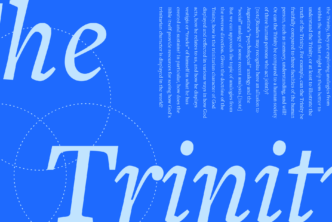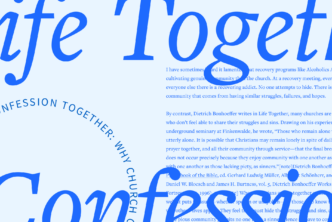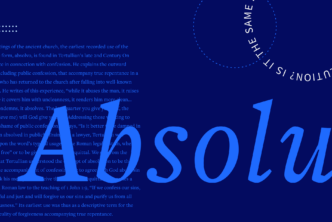Chris looked around the room full of pastors, ministry directors, and administrators, offered thanks and a winsome smile, and began to speak. He wore a t-shirt that read: “Dis·a·bled /ˌdisˈāb(ə)ld/ adjective: equally human.” A second-year seminary student working at the intersection of biblical studies, theology, and disability, Chris had much to offer our staff.
One of the most poignant reflections Chris shared was about a time when he was asked if he thought his vision would be restored in the fullness of God’s Kingdom. His response, in so many words, was that being differently abled has allowed him to perceive Jesus more fully, beyond what can be seen with the eyes. Instead, Chris encouraged us to ask, “how can what I have or don’t have be used to draw me closer to God?” That question will offer different models for our Christian faith.
Since Chris spoke, I’ve been wondering how our community might move beyond accommodation—merely making space for the differently abled—allowing our worship to be shaped by the unique perspectives of the differently abled among us. And what characters in Scripture, I began to wonder, can help inform this work?
In 2 Samuel, Mephibosheth, Saul’s grandson, had a childhood injury that left him with a physical disability for the rest of his life (2 Sam 4:4). Later, David famously and surprisingly invites Mephibosheth, a potential threat to David’s kingship, to join him at the king’s table (2 Sam 9). Perhaps this is merely an example of “keeping your friends close and your enemies closer,” but it might also reveal how God’s in-breaking Kingdom means former exclusions (“The blind and the lame will not get into the palace” [2 Sam 5]) are being undone in God’s long-arcing bend toward justice, reconciliation, and beloved community.
Centuries later, Jesus is at a dinner party, surrounded by religious leaders all elbowing for the best seat at the table, when he tells a story about a man who throws a great dinner party (Luke 14). When the man’s initial invitees all make excuses, the host tells his servant to “Go out at once into the streets and lanes of the town and bring in the poor, the crippled, the blind, and the lame” (Luke 14:21b). The differently abled, unlike the “busy,” are those who Jesus invites his hearers to imagine entering into the banquet prepared by the King. Their pace and posture allows them to enter into this celebration. “God’s time is slow, patient, and kind and welcomes friendship,” Jonathan Swinton writes in Becoming Friends of Time: Disability, Timefullness, and Gentle Discipleship. “It is a way of being in the fullness of time that is not determined by productivity, success, or linear movements toward personal goals. It is a way of love, a way of the heart.”
In John 9, Jesus’ disciples ask whether a man’s sin or his parents caused his blindness, they are corrected. “Neither,” Jesus says. “He was born blind so that God’s works might be revealed in him” (John 9:3). The man’s blindness is not a source of guilt or blame, Jesus explains, but the revelation of God’s glory.
Jesus heals the man and, in a series of exchanges, he is asked to account for his healing. “One thing I do know, that though I was blind, now I see,” the man tells a group of Pharisees, who keep asking this man to account for his sight. The irony, of course, is that those who believe they see clearly are unable to see (v.41), whereas the one identified as blind is the only one in this story who sees Jesus rightly, worshipping him as he deserves, and, in so doing, helping others perceive “The light of the world” (v.5).
When we are “too busy” to accept Jesus’ invitation to slow down and enter into the worshipful feast he has prepared, when those of us who claim to see are blind to Jesus’ healing presence among us, it is worth asking, How is space being made to learn from the differently abled members of our community, so that their perspective, posture, and pace might help us to enter into worship together? Beyond accommodation, may our worship reflect the fullness of all those God calls to the table.
Special thanks to Chris, Calvin, and Kenzie for their helpful insights on this article. Unless otherwise noted, all Scripture is from the New Revised Standard Version.
***
This article by Ryan Pemberton originally appeared in the November/December 2019 issue of Bible Study Magazine.






